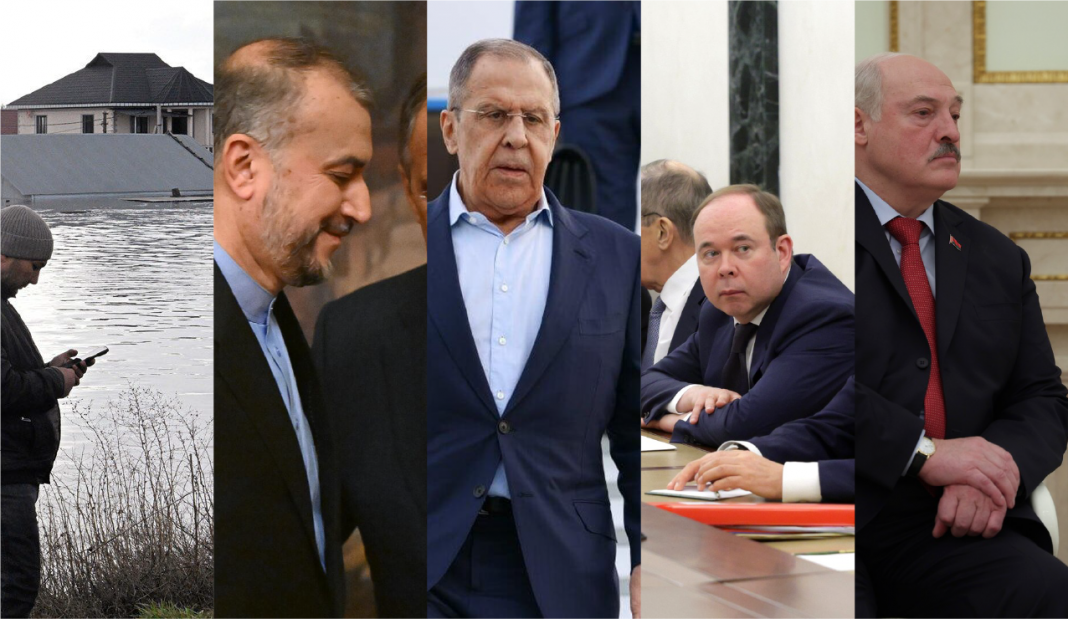This report describes the key events which significantly influenced Russia’s political, economic, and social processes.
Assessing the past week’s results, we determine the following trends:
- The flood in the Orenburg region showed that Russia has quite severe problems with several infrastructure facilities. At the same time, Russia faced the first spontaneous manifestation of citizen dissatisfaction since the start of hostilities against Ukraine and the first spontaneous manifestation of citizen discontent since the presidential elections – unrest among citizens began in Orsk, which suffered the most from the disaster. Attempts by the governor of the Orenburg region, Denis Pasler, to show toughness bordering on rudeness did not lead to the desired result: residents of Orsk demanded social compensation (they achieved their goal) and punishment for the perpetrators (this issue is up in the air, the authorities are trying to blame the builders of the dam, built in 2010, for negligence, as well as the current mayor Vasily Kozupitsu, who shortly before the disaster stated that the dam was in satisfactory condition).
- China and Russia agree on a common line of behaviour regarding the Peace Summit, initiated by the Ukrainian leadership and which will take place on June 15-16 in Switzerland. The Chinese side insists that the summit should mark the beginning of the negotiation process for restoring peace, which means it cannot be done without Russia’s participation. Most likely, the very participation (or non-participation) of China will be tied precisely to which format of the event will be chosen by the hosts. In any case, Lavrov’s visit demonstrated that mutual support and de facto allied relations continue to exist in relations between Russia and China.
- Russia actually supported Iran’s position and “blessed” the attack on Israel. It is believed that Russia has promised Iran support if Western countries launch military operations against Tehran. Russia benefits from Iran’s involvement in the war in the Middle East: the war can lead to an increase in oil prices in the near future, and Russia claims to increase oil supplies to China (Iran is the leading oil supplier to China). The very fact of war could delay American forces and resources for a new conflict, reducing assistance to Ukraine. Also, increasing oil prices could lead to undesirable processes within the United States. Thus, Russia is genuinely interested in escalating the conflict in the Middle East.
This digest covers the following topics, which were the most relevant for Russia between the 8th and the 14th of April:
- Flood in the Orenburg region and the Urals
- Telephone conversation between Vladimir Putin and the President of Kazakhstan Kassym-Jomart Tokayev;
- Sergei Lavrov’s visit to China;
- Meeting of Vladimir Putin with the President of Belarus, Alexander Lukashenko;
- Meeting with permanent members of the Security Council;
- Sergei Lavrov’s visit to Minsk;
- Telephone conversation between Sergei Lavrov and Iranian Foreign Minister Hossein Amir Abdollahian.
This Content Is Only For Subscribers
- Flood in the Orenburg region and the Urals
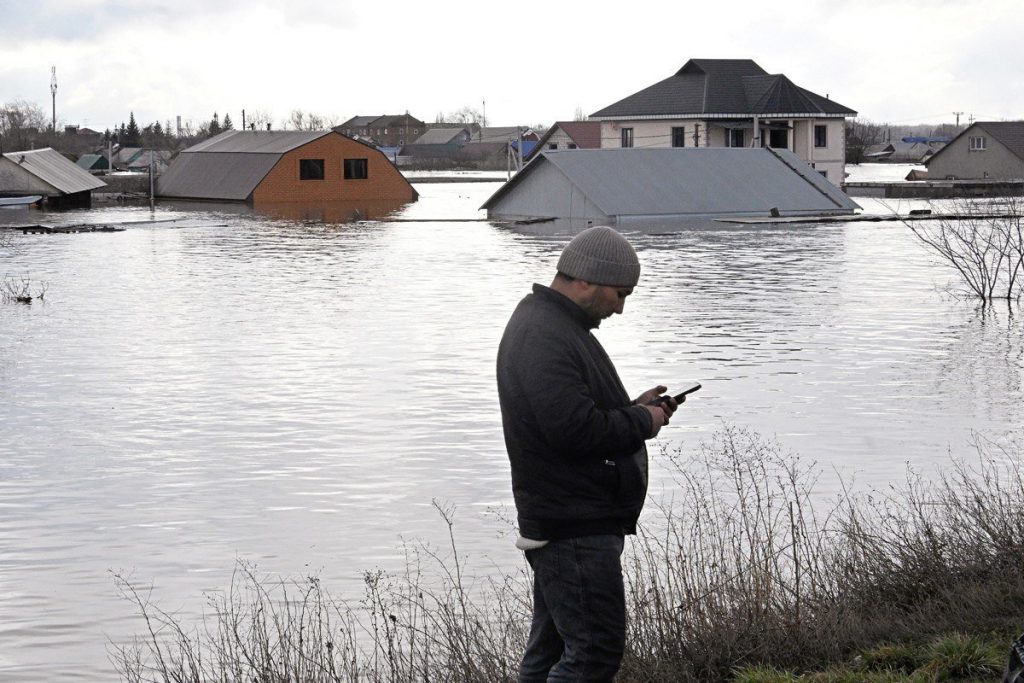
Last week, the flood situation in several Russian regions (Orenburg, Chelyabinsk, Kurgan and Tyumen regions) noticeably worsened. At the same time, the Orenburg region is suffering the most, where the Ural River overflowed its banks and flooded many settlements.
On Friday, April 12th, Orenburg authorities announced a large-scale evacuation of residents from some areas of the city. According to the latest data, the number of flooded garden plots and households continues to grow. Over the past 24 hours alone, 995 plots and 361 houses were under water. The total number of flooded areas reached 4963, and households – 2687. This is the unexpected picture that unfolded today in Orenburg and its environs.
The flood also affected other cities and regions. At the same time, residents are also being evacuated in some areas of Kazakhstan.
Outcomes and outlook:
The flood showed that Russia has quite severe problems with several infrastructure facilities. At the same time, Russia faced the first spontaneous manifestation of citizen dissatisfaction since the start of hostilities against Ukraine and the first spontaneous manifestation of citizen discontent since the presidential elections – unrest among citizens began in Orsk, which suffered the most from the disaster. Attempts by the governor of the Orenburg region, Denis Pasler, to show toughness bordering on rudeness did not lead to the desired result: residents of Orsk demanded social compensation (they achieved their goal) and punishment for the perpetrators (this issue is up in the air, the authorities are trying to blame the builders of the dam, built in 2010, for negligence, as well as the current mayor Vasily Kozupitsu, who shortly before the disaster stated that the dam was in satisfactory condition). It is quite possible that the real culprits of the catastrophe, who decided to “save” on construction work, will not be punished.
- Telephone conversation between Vladimir Putin and the President of Kazakhstan Kassym-Jomart Tokayev
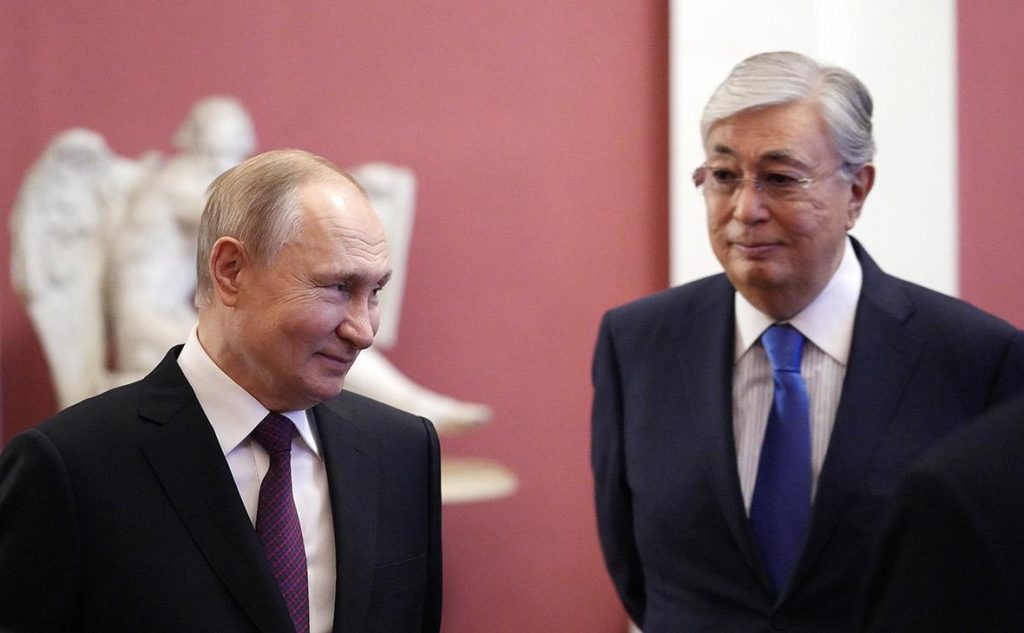
On Tuesday, April 9th, at the initiative of the Russian side, Vladimir Putin had a telephone conversation with the President of the Republic of Kazakhstan Kassym-Jomart Tokayev. The main topic of discussion was the problematic flood situation in the border regions of Russia and Kazakhstan. The parties noted the interaction of relevant departments and services of the two countries, which jointly monitor and forecast the situation and develop and implement coordinated response measures.
It is also noted that during the conversation, some aspects of international and regional issues were discussed, including Russia’s chairmanship in the Commonwealth of Independent States and Kazakhstan’s chairmanship in the Collective Security Treaty Organization.
Outcomes and outlook:
The flood situation in the Orenburg region and the Urals led to severe consequences for Kazakhstan. In 10 out of 17 regions of Kazakhstan, a local emergency was introduced due to floods. The country’s President Kassym-Jomart Tokayev called it the biggest disaster in Kazakhstan in the last 80 years. More than 60 settlements remained cut off from the outside world. In Western Kazakhstan, meltwater flooded eight cattle burial grounds and 14 anthrax burial sites. For this reason, the presidents of the two countries decided to hold a telephone conversation to coordinate actions to eliminate the consequences of the disaster. The remaining issues (of a political nature) were resolved in a working manner, especially since there are no significant disagreements between Russia and Kazakhstan on the matters stated.
- Sergei Lavrov’s visit to China
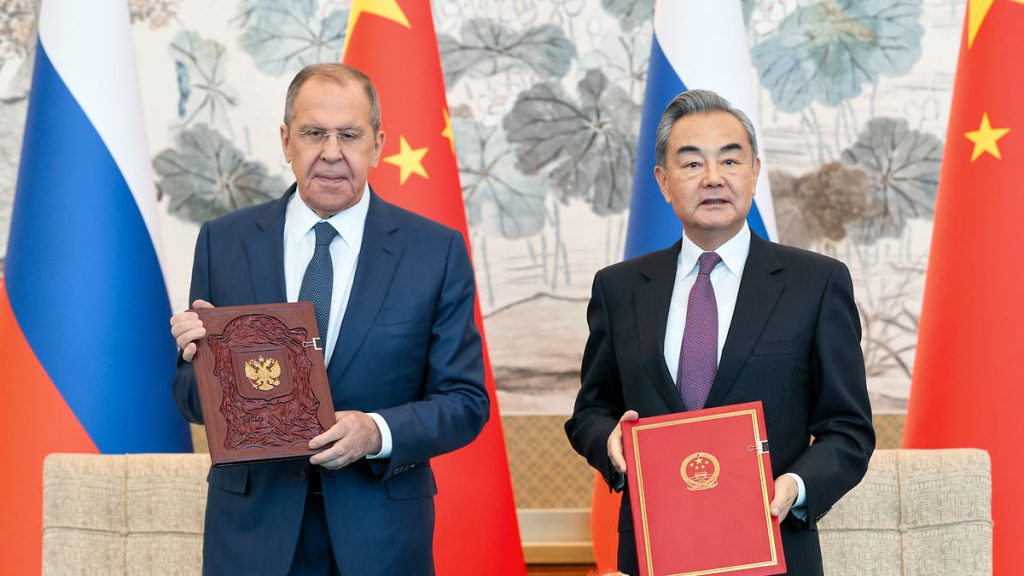
On Monday, April 8, Russian Foreign Minister Sergei Lavrov went on a two-day visit to China, where he held talks with his Chinese counterpart Wang Yi and also took part in several other meetings as part of strengthening bilateral communication and discussing the current international agenda.
In particular, it is noted that one of the important topics discussed during the negotiations between Lavrov and Wang Yi was the discussion of peace initiatives regarding Ukraine. The Russian side notes that the participants in the negotiations allegedly agreed that any measures to resolve the conflict without the participation of Russia are futile. The issue of sanctions pressure from the West, which the parties called illegal, was also discussed.
At the same time, Lavrov’s visit to China became the next stage in preparation for Vladimir Putin’s visit to Beijing. It is noteworthy that on April 9, the Russian president’s press service officially confirmed that such a visit should take place soon.
Outcomes and outlook:
The main topic of the negotiations between Sergei Lavrov and Wang Yi concerned the protocol of Vladimir Putin’s visit to the PRC (most likely it will take place in mid-May 2024). However, it is noteworthy that China and Russia agree on a standard line of conduct regarding the Peace Summit, initiated by the Ukrainian leadership and will take place on June 15-16 in Switzerland. The Chinese side insists that the summit should mark the beginning of the negotiation process for restoring peace, which means it cannot be done without Russia’s participation. Most likely, the very participation (or non-participation) of China will be tied precisely to which format of the event will be chosen by the hosts. In any case, Lavrov’s visit demonstrated that mutual support and de facto allied relations continue to exist in relations between Russia and China.
- Meeting of Vladimir Putin with the President of Belarus, Alexander Lukashenko
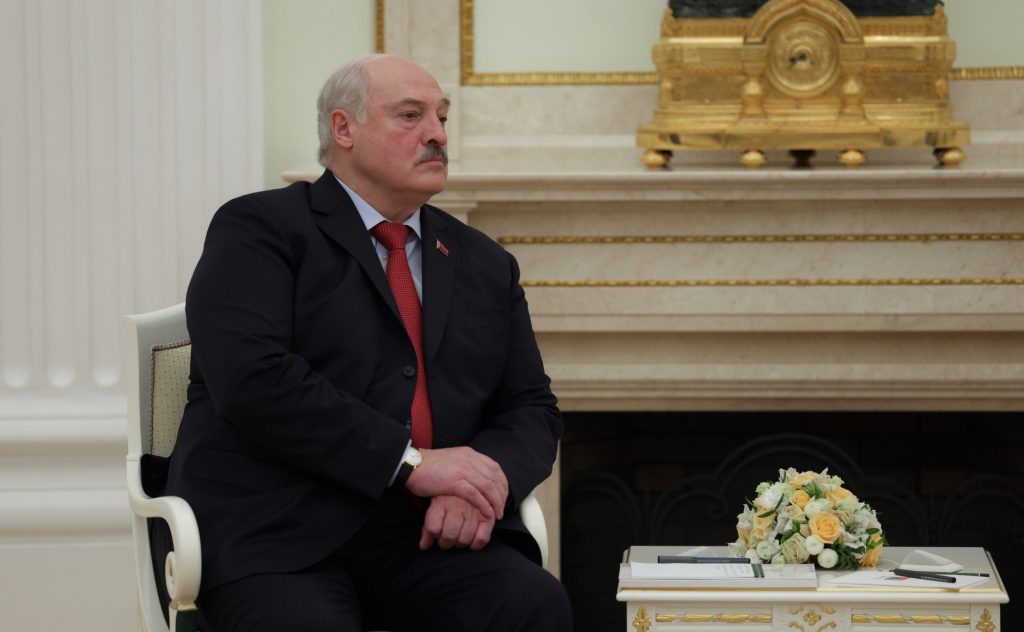
On Thursday, April 11, Belarus President Alexander Lukashenko arrived in Moscow on a working visit, where he held negotiations with his Russian counterpart. Like previous negotiations in a similar format, this meeting was accompanied by populist statements by the parties regarding Ukraine, the West, and several geopolitical processes.
The parties also discussed the prospects for further space industry development since the meeting coincided with Cosmonautics Day and the return of Russian and Belarusian cosmonauts from a mission to the ISS.
Key theses:
- Putin: “Thank you for coming to Cosmonautics Day. Moreover, we have a significant event: our cosmonauts, the first female cosmonaut from Belarus, returned to Earth. We also had a good event today: our new rocket flew from the new cosmodrome heavy. This is another stage in developing the space industry in Russia.”
- Putin: “Apart from everything else, of course, we have something to discuss, meaning our economic relations. They are thriving. We demonstrated good economic growth rates last year, and now everything is rising. Overall, our growth in the first months of this year is even greater than last year. Diversification is developing, cooperation is growing, and mutual complementarity is. Everything is, in general, on the rise. We are very happy about this.”
- Putin: “In general, we have never given up on the peaceful resolution of disputes. Moreover, we were inclined to do just that. We did not start this war in 2014. It all started with a coup in Ukraine. And then, when everything became so “hot” in nature, it was you who initiated the peace negotiations in Belarus. We started this in two cities. Then the negotiating teams moved to Turkey, to Istanbul. This large work was practically completed there; it went on for a long time, initialed on both sides. The Ukrainian one was also initiated, this paper was initiated, a document.”
- Putin: “As you know, then, under pressure from the West, the Ukrainian side abandoned these agreements. Let me remind you that at that time, we were told that we couldn’t sign the document, Ukraine couldn’t sign the document “with a gun to our temple,” and we needed to withdraw troops from Kyiv. We did it. Immediately after we did this, our agreements were thrown into the trash.”
- Putin: “Now, as you know, the idea is being promoted to hold some kind of conference in Switzerland. We are not invited there. Moreover, they believe that we have nothing to do there, and at the same time, they say that it is impossible to solve anything without us. Since we are not going there – this is already some kind of panopticon – they say we refuse negotiations. We weren’t invited, but they say we refuse.”
- Putin: “It would be funny if it weren’t so sad. Once again, I want to emphasise that we are for it—just not in the format of imposing on us any schemes that have nothing to do with reality. Why do I say this? Because, if the need arises, I will allow myself to contact you. Maybe we will continue consultations with you in this area.”
- Putin: “As for other areas, you are also well aware of this, for example, in the energy sector. Unfortunately, we have recently observed a series of attacks on our energy facilities and were forced to respond. I want to emphasise that even based on humanitarian considerations, we did not carry out any strikes in the winter. They wanted to leave social institutions, hospitals, and so on without power supply. But we were forced to respond after several attacks on our energy facilities.”
- Putin: “I repeat once again: if everything comes back to solving those issues that we talked about initially, and in the energy sector, they are connected, among other things, with solving one of the tasks that we set for ourselves – this is demilitarization… First of all, we proceed from the fact that, in this way, we influence the defence industry – the military-industrial complex of Ukraine directly. But, if we still move on to where I started, we move on to some conversations about resolving all issues in other ways; of course, as I have said many times on this subject, we are ready for this.”
- Lukashenko: “I have already said: our position is that they can only agree there on how to intensify the escalation of this conflict. Without Russia, what kind of peace process can there be? There can be no peace process.”
- Lukashenko: “Maybe they are right that they do not invite us there because what can you talk to them about if they are trying to gather more than 100 states there and dictate something to us or persuade us? This is not a proposal for peace negotiations.”
- Lukashenko: “My point is that I absolutely support the position of the current Russian leadership and your position on the peace process in this conflict; I support it. Today, there is everything to sit down and negotiate. They don’t want to – it’s clear why they don’t want to; we have already answered this question. This voice will be heard in Ukraine if they want to talk about peace overseas. Therefore, Ukrainians should know, especially the population that this does not depend on us. The ball, roughly speaking, is on the other side.”
- Lukashenko: “I remember this process, which began in Belarus, three rounds took place, the fourth round in Istanbul. And you then photocopied these documents and handed them over to me. They first showed this document, I read it, and then you gave it to me, as agreed. A document that has been initiated. There was serious progress: both the Russians “moved forward” and the Ukrainians. But then, clearly, they arrived and said: come on, fight until the last Ukrainian.”
- Lukashenko: “It’s exciting in the north, the Northern Sea Route. It turns out that we have already supplied goods along the Northern Sea Route. Having no ports in Murmansk, we have already delivered several thousand tons. It’s convenient for our manufacturers, so your support here was important and relevant for us.”
- Lukashenko: “What is there to hide here? We have already exchanged words with you on some economic issues. You supported me that on the 15th, our prime ministers will meet and look at economic issues that must be resolved. This is very important for us.”
- Lukashenko: “As for energy and striking, I remember this conversation, and even you were reproached in Russia: that’s why we need to hit these pain points, the energy sector. You said then, perhaps not in a military way: listen, I feel sorry for people—in kindergartens, in schools. If the energy sector in Ukraine collapses, children and people will suffer. These attacks on sensitive points in Russia—and the response is appropriate.”
- Lukashenko: “I am surprised, in general, what worries me the most, as I say, is the policy of the Polish leadership. Why do they need this confrontation? Both Lithuanians and Latvians throw dozens of corpses across the border. A certain number of migrants go there, and they – they built a fence – are thrown over the fence to our border. Now the snow has melted – corpses have been exposed, lying right on the border. There are people from Afghanistan, Iran, Africa. Why kill people and throw them away like barbarians? It creates tension.”
Outcomes and outlook:
Alexander Lukashenko’s visit to Moscow, in addition to the stated topic (successful completion of a space flight of a joint Russian-Belarusian crew and further steps to implement joint space programs), also had very specific results. Belarus has demonstrated that it continues to move closer to Russia and integrate into an increasing number of joint projects.
But at the same time, Lukashenko used the meeting to emphasise: Belarus does not intend to fight in Ukraine. Obviously, Russia is trying to push Belarus to more decisive actions and threatens provocations from Ukraine (Lukashenko made it clear that they were talking about possible attacks by Ukrainian UAVs on oil refineries in Mozyr and Novopolotsk).
According to reports, Putin was also interested in including two Belarusian refineries in producing fuel for Russian needs (since Russia is restoring its capacity damaged after the Ukrainian attacks). The meeting was also crucial because Putin once again spoke in favour of initiating peace negotiations with Ukraine (but based on the previously developed Istanbul proposals for 2022 and with adjustments in terms of borders). It is interesting that literally an hour before Putin’s statement about the possibility of negotiations with Ukraine, his press secretary Peskov made an opposite statement – that is, it is quite possible that the decision was made directly during negotiations with Lukashenko.
- Meeting with permanent members of the Security Council
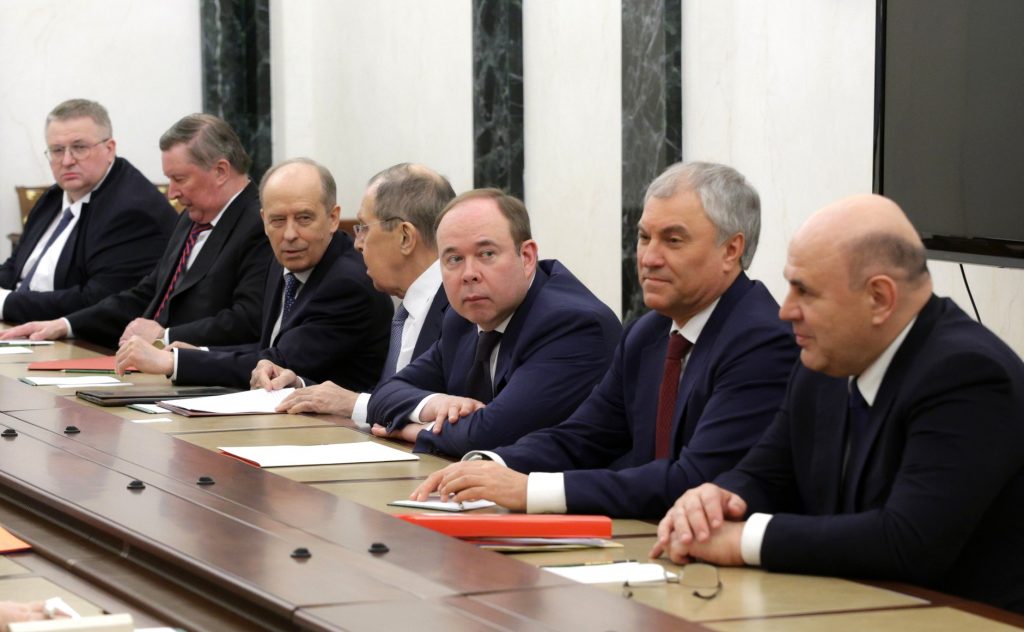
On Thursday, April 11th, Vladimir Putin held a regular meeting with permanent members of the Russian Security Council. Unlike previous meetings, this one took place live and not via video conference. According to official information, the main topic of the meeting was the development of the Eurasian Economic Union. Deputy Chairman of the Government Alexey Overchuk made a report.
The meeting was attended by Prime Minister Mikhail Mishustin, Chairman of the Federation Council Valentina Matvienko, Chairman of the State Duma Vyacheslav Volodin, Deputy Chairman of the Security Council Dmitry Medvedev, Head of the Presidential Administration Anton Vaino, Secretary of the Security Council Nikolai Patrushev, Minister of Internal Affairs Vladimir Kolokoltsev, Minister of Foreign Affairs Sergei Lavrov, Defense Minister Sergei Shoigu, Director of the Federal Security Service Alexander Bortnikov, Director of the Foreign Intelligence Service Sergei Naryshkin, as well as Special Presidential Representative for Environmental Affairs, Ecology and Transport Sergei Ivanov.
Outcomes and outlook:
The main topic of the meeting concerned the effectiveness of the Eurasian Economic Union and its transformation since the Russian leadership believes that the EAEU has recently been “working in one direction” – the EAEU countries actively use Russia as a donor but have minimal influence on the Russian economy. In fact, the EAEU countries gained access to the Russian market, which led to significant demographic imbalances, as well as to the fact that, along with economic initiatives, a flow of migrants from Central Asia (Uzbekistan, Kyrgyzstan, Kazakhstan) poured into Russia, which often poses a threat to stability and security of Russia. That is why the meeting was supposed to serve as the beginning of developing new rules in relations between Russia and the EAEU countries; these rules should potentially protect Russia and, simultaneously, strengthen the involvement of the EAEU states in general processes. The issue with Armenia (currently chairing the EAEU), which is increasingly distancing itself from Russia and joint projects, was also considered separately.
- Sergei Lavrov’s visit to Minsk
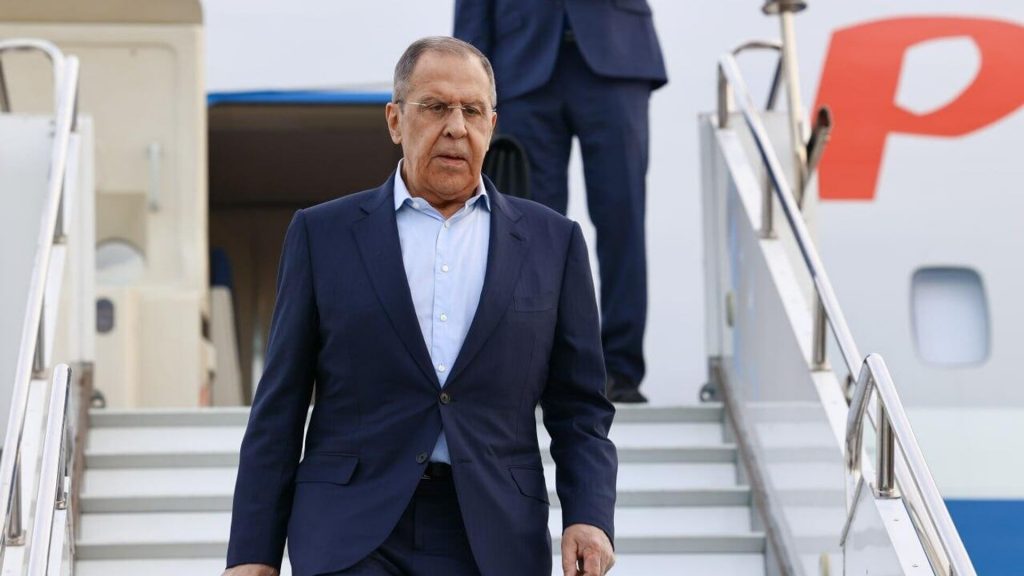
On Friday, April 12th, Russian Foreign Minister Sergei Lavrov paid a working visit to Minsk, where he participated in the Council of CIS Foreign Ministers. In addition to discussing internal issues, the head of the Russian Foreign Ministry used the event to once again voice Russia’s positions regarding several geopolitical processes.
Key theses:
- “Russia is presiding over the CIS this year. Our main priority is to ensure the further development of integration ties in all areas, including the economic sphere, the field of security and law and order, and the cultural and humanitarian areas. A large-scale plan for implementing the Concept of the Chairmanship of the Russian Federation in the CIS was prepared to achieve these goals. It includes more than 150 items.”
- “Today’s meeting provided an excellent opportunity to exchange views on issues on the international agenda. Much attention was paid to interaction in the field of security in the CIS space and on the Eurasian continent, including the joint fight against various threats and challenges. In this context, certain aspects of cooperation in the field of migration were considered. During their speeches, all our colleagues confirmed their solidarity with Russia and its people in the face of the threat of terrorism, including in connection with the disgusting terrorist attack at Crocus City Hall.
- “We look forward to further fruitful interaction with the co-chairs in the CIS – the Kyrgyz Republic and the Republic of Tajikistan, as well as all other partners in implementing the agreements reached and the ambitious tasks facing the organisation this year. We share the conviction that the development of multifaceted cooperation in the Commonwealth format meets the interests of all its participants.”
- “Unfortunately, the principle when the parties directly seek mutually acceptable solutions without outside interference was undermined in Istanbul. After initialling the document, which reflected the realities at that time, the West intervened, including in the person of the then British Prime Minister Boris Johnson, and forbade Zelensky to finally sign this agreement, saying that the war must be continued.”
- “If the inability to negotiate, which clearly now characterises the Kyiv regime, persists, then it is difficult to imagine a situation when it will be possible to do something. Instead of direct dialogue, without any ultimatums, the West is imposing the “Copenhagen process”, preparing a conference in Switzerland, at which (this is stated directly) they want to formulate and “bring to mind” the notorious ten points of Zelensky’s “peace formula”. Then, “present” this to the Russian Federation. That this is a road to nowhere, to put it mildly, is obvious to any normal political observer.”
- “The Chinese twelve-point plan and the Swiss formula are incompatible. As I already said, the Swiss formula is to “pull” by hook or crook as many countries as possible to an ultimatum to Russia. The Chinese idea is to first deal with systemic security problems in our common space, with the root causes of the current situation in Ukraine, reflecting a hybrid war that has been long prepared against us and ultimately unleashed by the West with the hands and bodies of Ukrainians, and now also Ukrainian women. Only by eliminating these root causes, says the Chinese approach, can we seriously consider an agreement that will consider (I emphasise again) the legitimate security interests of all parties. This is approximately the same thing we proposed back in December 2021: to agree on the indivisibility of security and how it will be translated into practical steps for NATO non-expansion, the necessary guarantees and everything else.”
- “China and Switzerland have incompatible approaches. Swiss “initiatives” are only fulfilling the “order” of the United States and its allies. I don’t see how you can put a hedgehog and a tremulous doe in one team. It’s hard to imagine. The Chinese approach is absolutely consistent with our common philosophy, including in the context of the now intensified discussion on how to ensure Eurasian security throughout our continent: in its European part, in Central Asia, in the Caucasus and in other regions of the continent where there is turbulence situation and conflicts flare up.”
Outcomes and outlook:
Sergei Lavrov’s speech de facto summed up Russia’s previous positions on many issues, including the war in Ukraine. It revealed that Russia continues to insist on old principles: recognition of territorial gains and a new border with Ukraine, demilitarisation of Ukraine, guarantees of Ukraine’s neutrality, “denazification”, etc. At the same time, Lavrov strongly emphasises that Russia and China have joint approaches and principles on these issues (Lavrov spoke in Minsk immediately after returning from China from negotiations with his Chinese colleague Wang Yi). Thus, Lavrov’s speech can also be regarded as “transferring the will of Beijing” to representatives of the CIS countries (an association increasingly drawn into China’s sphere of influence).
- Telephone conversation between Sergei Lavrov and Iranian Foreign Minister Hossein Amir Abdollahian
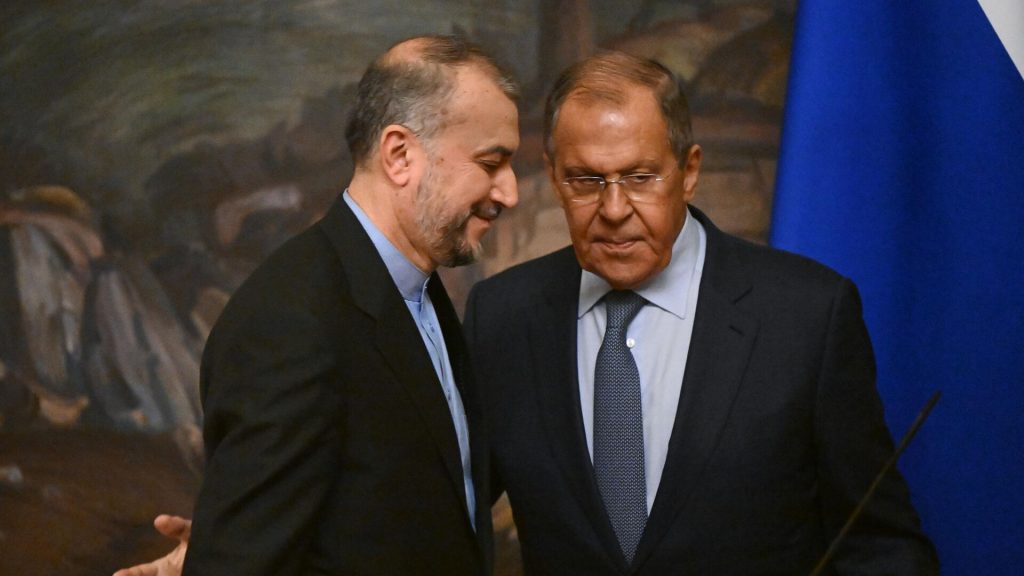
On Saturday, April 13th, Sergei Lavrov spoke with Iranian Foreign Minister Hossein Amir Abdollahian. In particular, during the conversation, the parties discussed the situation in the Middle East.
According to official statements by the parties, during the conversation, Sergei Lavrov once again emphasised his strong condemnation of the April 1 Israeli airstrike on the Iranian consular office in Damascus. The parties also emphasised that any attacks on diplomatic and consular facilities, the inviolability of which is guaranteed by the relevant Vienna Conventions, are categorically unacceptable, as are political murders.
As a result of the conversation, the mutual commitment to maintaining a high level of coordination on current issues of the international and regional agenda was confirmed. The interest of both parties in the consistent increase in political and diplomatic cooperation, as well as trade and economic interaction, including in the transport and logistics sector, was stressed, including transit transportation.
It is noteworthy that the conversation took place several hours before the start of a massive attack by Iranian UAVs and missiles on Israeli territory.
Outcomes and outlook:
The telephone conversation between Lavrov and Abdollahian took place immediately before Iran attacked Israel. And if most world leaders tried to prevent the strike, then, as follows from official documents, Russia supported Iran’s position and “blessed” the strike. It is believed that Russia has promised Iran support if Western countries launch military operations against Tehran. Russia benefits from Iran’s involvement in the war in the Middle East: the very fact of the war can soon lead to an increase in oil prices, and Russia claims to increase oil supplies to China (Iran is the leading oil supplier to China). The very fact of war could delay American forces and resources for a new conflict, reducing assistance to Ukraine. Also, increasing oil prices could lead to undesirable processes within the United States. Thus, Russia is genuinely interested in escalating the conflict in the Middle East.

